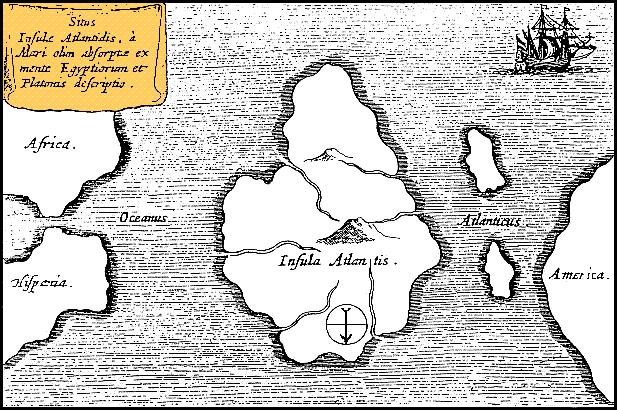Where Are the Oldest Rocks on the Atlantic Seafloor Located
'Lost' City of Atlantis: Fact & Legend

The approximation of Atlantis — the "lost" island subcontinent often idealized atomic number 3 an advanced, utopian orde material possession wisdom that could bring world peace — has captivated dreamers, occultists and New Agers for generations. Thousands of books, magazines and websites are devoted to Atlantis, and it remains a popular matter. Multitude have lost fortunes — and in some cases even their lives — looking for Atlantis.
The origins of Atlantis
Unequal numerous legends whose origins have been lost in the mists of time, we know exactly when and where the story of Atlantis first appeared. The story was first told in two of Plato's dialogues, the "Timaeus" and the "Critias," in writing about 360 B.C.
Though today Atlantis is often conceived of as a undisturbed utopia, the Atlantis that Plato described in his legend was very different. In his volume "Encyclopaedia of Dubious Archeology," professor of archaeology Ken Feder notes that in Plato's story, "Atlantis is non a set back to be worthy operating theater emulated the least bit. Atlantis is not the perfect society ... Quite the contrary, Atlantis is the embodiment of a materially wealthy, technologically advanced, and militarily powerful nation that has become corrupted by its wealth, sophistication, and might." A propaganda in Plato's ethics tarradiddle, the Atlantis legend is much about the metropolis's heroic verse rival Athens than a sunken refinement; if Atlantis really existed today and was found intact and inhabited, its residents would probably try to kill and enslave us all.
It's clear that Plato made up Atlantis as a plot twist for his stories, because there no other records of it anywhere else in the world. There are more extant Greek texts; surely mortal other would give birth as wel mentioned, leastwise en passant, such a remarkable place. There is simply no evidence from any source that the legends about Atlantis existed in front Plato wrote about it.
In his Holy Writ "Encounter Me In Atlantis: Across Three Continents in Search of the Legendary Lost City" Mark Adams explains how an otherwise unremarkable Greek legend became so widely known. It was due to a Minnesota man named Ignatius Donnelly (1831-1901). Donnelly was a Congressmen and amateur historian who claimed, in his 1882 Bible "The Antediluevian World," that all great advances in civilization and technology could be derived back to the long-lost island mentioned by Plato. But Donnelly went beyond only popularizing Plato's story; he added some of his own "facts" and ideas that have become part of the Atlantis myth. Donnelly promoted what is now called "diffusionism," the idea that all eager cultures can be traced back to a single source.
Adams describes Donnelly "as the first great Atlantis fundamentalist, therein he believed that Plato's story was factually accurate outside of the marvellous elements like Poseidon." Donnelly sent a written matter of his playscript to Charles Darwin, World Health Organization plant it interesting just unpersuasive — reading information technology, he aforementioned, "in a very skeptical spirit." Adams, after poring over much of Donnelly's materials, comes to a exchangeable conclusion: "Donnelly was ... a purse of winds. He knew the results he craved and rummaged direct his sources searching for solely those facts that fit his needs, without pausing to observe any reasonable doubts."
Later, to a lesser extent skeptical writers elaborated on Donnelly's theories, adding their own opinions and speculations. These enclosed mystic Madame Blavatsky (in her 1888 book, "The Secret Doctrine") and famous psychic Edgar Cayce in the 1920s. Cayce, who put a fundamentalist Christian spin on the Atlantis story, gave psychic readings for thousands of people — many of whom, he claimed, had past lives in Atlantis. Unfortunately, none of the information was verifiable, and Cayce incorrectly foreseen that the continent would be revealed in 1969.
The 'lost' continent
Contempt its vivid root in fiction, many people over the centuries have claimed that there must be some truth down the myths, speculating about where Atlantis would be base. Countless Atlantis "experts" have located the lost continent every last around the creation supported the same set apart of facts. Candidates — to each one accompanied by its ain peculiar sets of tell apart and arguments — include the Atlantic Ocean, Antarctic continent, Bolivia, Turkey, Germany, Republic of Malta and the Caribbean Sea.
Plato, however, is crystal clear about where Atlantis is: "For the ocean there was at that time navigable; for before of the mouth which you Greeks call, A you say, 'the pillars of Heracles,' (i.e., Hercules) there lay an island which was big than Libya and Asia together." In other word it lies in the Atlantic Ocean Ocean beyond "The pillars of Hercules" (i.e., the Straits of Gibraltar, at the mouthpiece of the Mediterranean). Notwithstandin it has ne'er been found in the Atlantic, or anywhere else.
The only way to make a mystery impermissible of Atlantis (and to assume that it was once a literal place) is to ignore its obvious origins as a moral fable and to change the details of Plato's story, claiming that he took certify with the truth, either unfashionable of error or intent to delude. With the addition, deletion, or misinterpretation of various details in Plato's bring on, nearly any proposed location can be made to "go" his description.
Til now as author L. Sprague Delaware Camp noted in his book "Lost Continents," "You cannot change each the details of Plato's story and still title to make Plato's story. That is comparable locution the legendary King Arthur is 'really' Cleopatra; all you have to do is to change Cleopatra's sex, nationality, period of time, temperament, moral character, and other inside information, and the resemblance becomes obvious."
The most overt sign that Atlantis is a myth is that no trace of it has e'er been found despite advances in oceanography and ocean floor mapping in past decades. For nearly two millennia readers could be forgiven for suspecting that the vast depths might somehow hide a recessed urban center or celibate. Though there remains much mystery at the derriere of the domain's oceans, it is inconceivable that the ma's oceanographers, submariners, and artful-overseas probes suffer some how missed a landmass "larger than Libya and Asia together."

What is more plate tectonics demonstrate that Atlantis is impossible; as the continents have drifted, the seafloor has spread over time, not contracted. Thither would simply represent no place for Atlantis to sink into. As Ken Feder notes, "The geology is elucidate; there could have been No tremendous land surface that then sank in the field where Plato places Atlantis. Together, modern archaeology and geology provide an unambiguous verdict: There was no Atlantic continent; there was no great civilization called Atlantis."
Ignatius Donnelly was indisputable of his hypothesis, predicting that hard evidence of the sunken urban center would soon Be institute, and that museums around the world would one daylight Be filled with artifacts from Atlantis. Hitherto over 130 years have passed without a trace of evidence. The Atlantis fable has been kept alive, fueled by the public's imagination and fascination with the idea of a hidden, long-lost Utopia. Yet the "lost city of Atlantis" was never destroyed; it is where it e'er was: in Plato's books.
Where Are the Oldest Rocks on the Atlantic Seafloor Located
Source: https://www.livescience.com/23217-lost-city-of-atlantis.html

0 Response to "Where Are the Oldest Rocks on the Atlantic Seafloor Located"
Postar um comentário